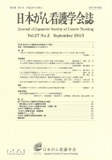Japanese
English
- 販売していません
- Abstract 文献概要
- 参考文献 Reference
- サイト内被引用 Cited by
要旨
本研究の目的は,早期食道がんにより食道全摘・胸壁後経路再建術を受けた患者が,どのように生活への影響を受け,どのような対処を行っているのかを患者自身の視点から明らかにすることである.
データ収集は術後外来通院中の患者に対する半構造的面接により行い,質的帰納的に分析した.研究にあたり所属機関などの倫理委員会の承認を得た.
対象者は50〜70歳代の男性6名であった.病期は0期が1名,1期が5名であり,術後からの期間は7〜14カ月であった.インタビューは1人につき1回,時間は平均41.5分であった.分析の結果,生活への影響と対処は「予期に反して普通にできていたことができず動揺する」,「手さぐりと失敗,揺らぎの繰り返しにより食べ方をつかむ努力をする」,「普通の暮らしを継続するための努力と調整をする」,「回復による日常生活の安定感,安心感が得られず閉じこもる」,「体重と体力の変化から回復力を実感する」,「にわかに回復しなくとも命拾いした体と折り合いをつけ自分なりに生きる」の6つのカテゴリーにより構成されていた.
対象者は予期に反して重大な食事摂取困難や体力低下を体験し,社会的生活にまで影響を受けていた.術後の障害は他者に理解されにくく心理的に閉じこもりながらも,手さぐりと失敗の繰り返しの中で自分なりの対処法を獲得している現状や,少しずつ回復力を感じることで困難と折り合いをつけていくことが明らかとなった.
Abstract
Aim of study : This study aimed to understand the awareness of outpatients regarding the influence on their daily life after total extirpation with reconstruction by retrosternal substitution of the esophagus.
Method of study : Semi-structured interviews were conducted with outpatients who had undergone radical surgery for esophageal cancer. The interview results were qualitatively and inductively analyzed. Before beginning research, approval of the Ethics Committee of the affiliated organization was obtained.
Subjects : Six male patients in their 50s, 60s or 70s were the subjects of the study. One was a stage 0 esophageal cancer patient, and the other five were stage I. 7 to 14 months had passed after surgery. Each patient was interviewed once for 41.5 minutes on average.
Interview analysis : The subjects' awareness about the influence on their daily way of life after radical surgery is summarized in the following six items. 1. The feeling of being disturbed at finding it unexpectedly difficult to do things they had been able to do without difficultly before the surgery. 2. The need to make trial-and-error efforts to adapt to changes in diet, while having a recurring feeling of unease. 3. The need to make extra effort to adjust to postoperative life in order to carry on their normal life. 4. Withdrawal into themselves because they do not feel they have recuperated enough to go about their daily lives steadily and free from care. 5. The realization they have been recuperating as they gradually adapt themselves to gain weight and build their physical strength. 6. Belief that the surgery gave them a new lease on life, and determination to find a new way of life and reconcile themselves to their postoperative physical condition, without being impatient for quick recuperation.
Copyright © 2013, Japanese Society of Cancer Nursing All rights reserved.


